Welcome to the first ever edition of Army Rivalries, a column teased in March 2024. To get the ball rolling, the first edition will be a look back into July 2012 from the perspective of someone who was leading at the time: me.
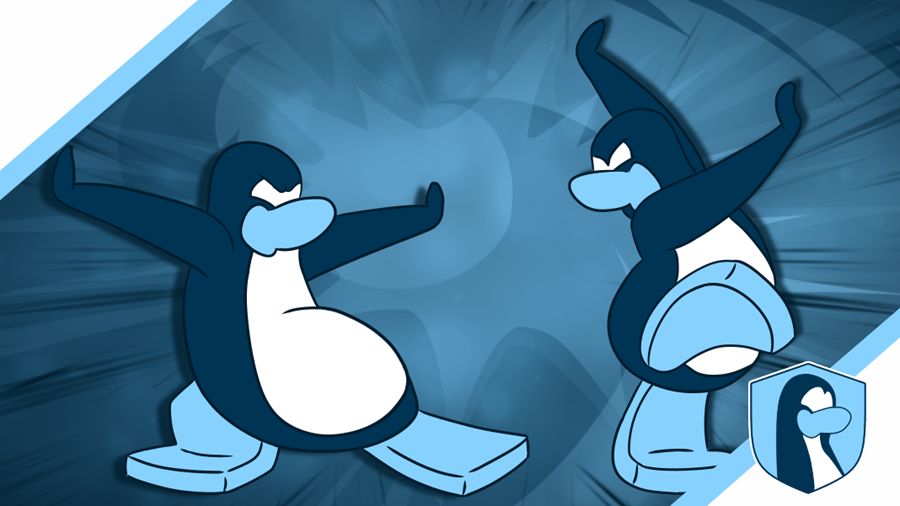
Designed by Wynn
If you have never heard of the Army of Club Penguin and Nachos rivalry then I strongly suggest you do your own research. There is too many battles and important events to cover. It goes without saying that the two armies had the best army rivalry at all time. Nachos were the Gary to Army of Club Penguin’s Ash Ketchum. It was a balance of yin and yang that would go on to see the armies become allies towards the end of Club Penguin’s original lifespan.
Please note that this post is about a topic that I personally led for, therefore may contain my own perspective.
Background
Following a year long conflict of on-and-off war between the Clovers and the Light Troops, it was time for Commander in Chief Flipper7706 and Kenneth1000 to retire. However, a new war was nigh and it would kick start with a double raid. On June 24, 2012, the Nachos decided to log onto Breeze: the capital of their green rivals.
Wasting no time to respond, the Army of Club Penguin logged on to defend. As the battle began to die down, the Clovers would chase the Nachos to their own capital of Fjord, returning the raid with a raid of their own. Later in the week, another raid on Clover land took place. It was made clear by the Nachos’ initial actions, but it was ultimately Kenneth1000 who first released a declaration of war post alongside his own retirement.
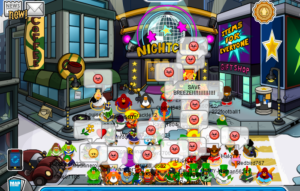
A brawl on Breeze
Hot Potato
Unfortunately, this war came at an interesting time for the Army of Club Penguin. It had been decided by the High Commanders that Slider568 would become the next Commander in Chief. Yet, hours into his leadership, he suddenly announced his retirement as he “hit the goal he set out for himself.” This left the army in a scramble. Mchappy was the next choice to be Commander in Chief, already having a previous stint the year prior.
Strike While the iron is hot
Following the reconstruction of their leadership, wasting no time at all, Army of Club Penguin continued a round of raids. This time the target was a server known as White House. The raids done by the two opposing armies in July 2012 may be some of the last battles that relied on the natural use of age old rogue warfare.
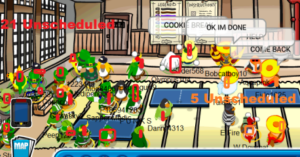
Good ole Dojo fighting
Little did everyone know that the best battle of 2012 was approaching. For context, the army community at this time did not have any sort of judging system outside of tournament sanctioned events. This meant that it was up for the armies to decide who won each battle. Additionally, the meta at this time favored an invading army. When an army is invading, they must move from room to room, with the expectation that the defending army will follow.
As a result, the war score became highly contested at points. The battle for Cloudy, the first official invasion of the war, was to set the tone. It was not until the third battle, over Brumby, that one of the armies would concede defeat: the Nachos.
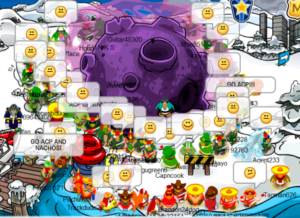
July 3, 2012: Battle for Cloudy
Winning Streak?
On top of having two battles a day, battles would last over an hour. Both armies were too stubborn. Since the defending army was expected to follow the invading army around the server, it led to arguments over who won. While the Nachos would tout their tactics as giving them cutting edge, the Army of Club Penguin would point to their size and resilience to be the last to log off as reasons for their victory.
It was not until July 18 that the Clovers would admit for the first time. The battle of Big Snow put a halt to the ten battle win streak the army was sporting. However, it wouldn’t take long for the army to claim again that the next battles were in their favor bringing the war score to 12-1-1 in favor of the Clovers.
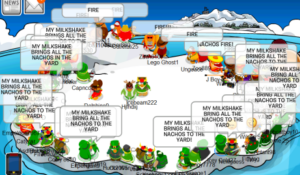
July 18, 2012: Battle of Mukluk
Remarkably, as a way to combat the stand still of both armies claiming victory over numerous key battles, a rematch was agreed upon. The rematch would be for Nachos’ capital, Fjord. The rematch was announced on July 22 and scheduled for July 26. Although this seemed to be a step in the right direction towards better sportsmanship, everything would change soon after.
Mchappy is a hacker
Later on the very same day, rumors were picked up by the community news organization at the time that Mchappy had hacked the Nachos xat chatroom. Nachos’ chatroom was reset, causing paranoia to spread, with no one claiming responsibility. Then, the most infamous picture of my army career surfaced.
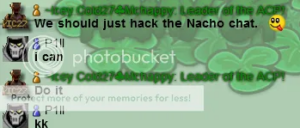
Who are you, P1ll?
With accusations being thrown my way of such a crime, I chose to do the thing I know best. I walked away. Of course my innocence would later by proven by people such as Boomer 20. But I was young, and I did not want to play against liars.
Whether it was a scheme by Nachos or not, my disappearance from the Clovers allowed for Nachos to gain some uncontested victories and go on a winning streak. In my absence, Kingfunks4 was the new leader, but it was becoming too much for any one leader to handle. There was no rule against the amount of invasions an army could schedule.
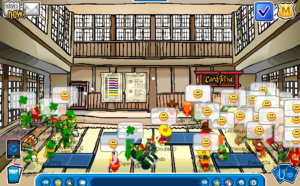
July 26, 2012: Nacho victory on Wool Socks
The end is near
The war continued on for a few more days, mostly with Kingfunks4 taking advantage of his European time zone to combat against the onslaught of Nacho wins. Invasions started to take place at 10am UK instead of the traditional American-friendly time slot. Eventually, the Light Troops showed up, knocking at the door for their own war with the Clovers.
Thus, on July 29, 2012, the Army of Club Penguin and Nachos decided to come to an agreement. All of the Clovers’ servers would be returned to them, with Nachos gaining four servers. Despite their strong start, Army of Club Penguin could not withstand the Nachos who were making up lost ground in a week with constant invasions. So is fair in love and war.
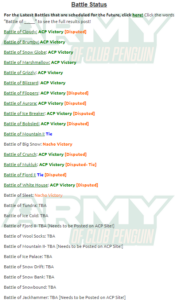
Army of Club Penguin war tracker prior to the “hacking accusation”
Conclusion
In conclusion, the war of July 2012 is a textbook example of army rivalry. Army of Club Penguin and Nachos already had much established history by this point. Additionally, the two armies were the top dogs of the community. It was the tug-and-pull you want to see from a war that was between the best of the best.
In my opinion, the July 2012 between the two may very well be one of the last remnants of the older warfare style. Following this war, the rise of a newer generation of armies and tactics took center stage. And although some tactics used through this war may be questionable, it defined a generation. It even nabbed me a “Best Leader” award, somehow. It was the transitional war that concluded an age old rivalry. What other army rivalries are you interested in reading about?
[…] a new Black Alliance emerged which factored into several wars throughout the year. Likewise, the rivalry between LT and ACP culminated in another war not long after Waterkid101 retired from LT. LT’s […]